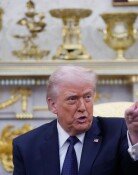Washington Wants a Breakthrough in Beef Issue
Washington Wants a Breakthrough in Beef Issue
Posted June. 14, 2008 08:21,
Korea and the United States entered an additional negotiation over the resumption of U.S. beef imports in Washington on Friday afternoon local time.
To this, a diplomatic source said Thursday that Washington will actively engage in the negotiation, quoting a high-ranking White House official as saying, We fully understand the situation the Korean government is facing.
We are not pleased. Some arguments made by Korean people (that U.S. beef is not safe) dont make sense. But we understand the gravity of the situation there in Korea, the source quoted the official as saying.
In the additional negotiation with U.S. Trade Representative Susan Schwab, Trade Minister Kim Jong-hoon will ask that both governments draw up a written document that stipulates American exporters voluntary restraint on export of beef from cattle older than 30 months for a certain period of time.
As one of the ways to bar export of older cattle, Seoul is expected to suggest the introduction of a beef export verification (EV) program .
However, Washington is reluctant to produce a written form that is legally binding, beyond issuing a statement or a letter, according to diplomatic sources.
The EV program is to give additional assurances to importing countries when the hygiene conditions of imported beef differ from those of beef distributed within the United States. Some 20 American beef importing countries now operate the EV program. However, the program is not necessary for Korea since Korea applies to American beef the same hygiene standards as those of the United States.
Washington argues that the application of the EV program is out of the question given that not only Korea but also other countries, which carried out beef negotiations with the United States after the World Organization for Animal Health (OIE)s ruling came out, lifted the ban on age limits. The enforcement of voluntary restraint will have negative impacts on Koreas trade with other countries in the future, because it violates trade rules set by the World Trade Organization (WTO), said American counterparts.
The reason we asked our trade counterparts to remove age limitations is not because we have high economic interest in the export of beef from cattle over 30 months old, but because we believe that the same domestic and international standards should be applied to beef for exports, said an official at the U.S administration who added that beef from cattle older than 30 months only makes up 5 percent of the whole beef supply.
One trade expert in Washington said, There will be middle ground for both Korea, who wants some form of assurance from the U.S. government, and the United States, who wants private sectors to find solutions.
In this context, another solution is beef exporters voluntary guidelines that only allow export of beef from cattle younger than 30 months for the time being and the U.S. governments encouragement and monitoring of the observance of these guidelines.
If both countries fail to reach some consensus, its possible that Korea will unilaterally reject the implementation of the deal, one trade expert said, and added, Then, the United States may take the issue to the WTO, but this is not an issue that needs a counterparts agreement.
In the meantime, U.S. Deputy Assistant Secretary for East Asia and Pacific Affairs Alexander Arvizu told reporters, We will make every effort to make a breakthrough since the situation in Korea is deadly serious. Making progress and settling the issue is in the interest of both countries.
sechepa@donga.com







